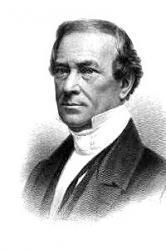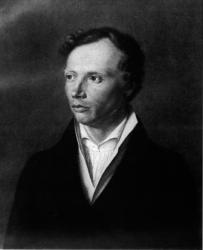1788 - 1870 Hymnal Number: 178 Author of "They talked of Jesus as they went" in Hymns of the Ages (3rd series) Grinfield, Thomas, M.A., b. Sept. 27th, 1788, and educated at Paul's Cray, Kent, and Trinity College, Cambridge. Taking Holy Orders in 1813, he was (preferred to the Rectory of Shirland, Derbyshire, in 1827 (Lyra Britannica, 1867, p. 256). He died in 1870. His published works include:— (1) Epistles and Miscellaneous Poems, London, 1815; (2) The Omnipresence of God, with Other Sacred Poems, Bristol, 1824; and (3) A Century of Original Sacred Songs composed for Favourite Airs, London, 1836.
From Nos. 2 and 3 the following hymns have come into common use:—
1. And is there a land far away from sin and woe? Heaven. No. 84 of his Century of Original Sacred Songs, 1836, in 4 stanzas of 4 lines, and headed "The Heavenly Land."
2. 0 how kindly hast Thou led me [us]. The Divine Guide, No. 88 of his Century, &c, 1836, in 2 stanzas of 8 lines, and entitled "Remembrance of the Way." In 1838 it was given as No. 166 in J. H. Gupaey's Lutterworth Collection, 1838; in M. Marylebone Psalms & Hymns, 1851, No. 165; Lord Selborne's Book of Praise, 1862, No. 208, and other collections.
3. Then it burst, the glorious view. Heaven. First published in his Omnipresence of God, &c, 1824, p. 181, in 3 stanzas of 8 lines, and entitled "The New Jerusalem." It is given in Snepp's Songs of Grace & Glory, 1872, No. 1003.
4. They talked of Jesus as they went. The walk to Emmaus. First published in his Century, &c, 1836, No. 52, in 5 stanzas of 8 lines, and headed 'The Visit to Emmaus." It was given in Lord Selborne's Book of Praise, 1862, No. 297, and in Lyra Eucharistica, 1863.
5. Though far from thy [your] country, unfriended, unknown. Departure of Missionaries. Appeared in his Century, &c, 1836, No. 38, in 5 stanzas of 4 lines, and headed "Departure of Missionaries." In Dale's English Hymn Book, 1874. No. 1031, it is somewhat altered, and stanzas iii. and iv. are omitted.
6. 'Tis come, the time so oft foretold. Christmas. No. 68 in his Century, &c., 1836, in 10 stanzas of 6 lines, and headed "Angels announcing to Shepherds the Birth of a Saviour. A Christmas Ode." In J. H. Gurney's Lutterworth Collection, 1838, stanzas i., vi., ix., x. were given as No. 254. These were repeated in his Marylebone Psalms & Hymns, 1851, as No. 260; and in Lord Selborne's Book of Praise, 1862, as No. 32.
7. 'Tis not in circumstances. Faith. In its original form this is not in common use, except in The Comprehensive Rippon, 1844,but it appeared as No. 44 in his Century ,inc., 1836, as "Ail may be outwardly," in 4 stanzas of 12 lines. In Dr. Dale's English Hymn Book, 1874, No. 592, stanzas iii.-iv. are given in a slightly altered form.
8. When my heart beguiling. Presence of Christ desired. Pt. ii. of Song 2 in his Century, &c, 1836, in 13 lines, and headed "Remember me. The Christian's request of his Saviour." In Dale's English Hymn Book , 1874, No. 534, line 7 is omitted.
9. Why art thou grieving? Trust. No. 17 of his Century, &c, 1836, in 2 stanzas of 12 lines, and headed "Why art thou disquieted? Hope thou in God." In Dale's English Hymn Book, 1874, No. 599, it begins "Why are we grieving?" and is divided into 6 stanzas of 4 lines.
In addition to these hymns there are in the Lyra Britannica, 1867, the following:—
10. All may be outwardly. The Heart the seat of Peace or Pain. No. 44, but see No. 7 for this.
11. Grant me, Lord, to walk with Thee. Simplicity.
12. 0 could we pilgrims raise our eyes. Walking by Faith.
Of these, No. 10 is in Sacred Melodies appended to some editions of the Comprehensive Rippon, together with the following:—
13. Happy those who rest have found. Repose in Jesus. No. 59.
14. How still amidst commotion. Hope.
15. 0 do not forsake me, my Father, my Friend. God's continued presence desired.
16. Sweetly let's join our evening hymn. For use at Sea.
17. Sweetly ye blow, celestial gales. For use at Sea.
18. Wake, my voice, O wake once more. Farewell.
These hymns all appeared in his Century, &c., 1836. [William T. Brooke]
-- John Julian, Dictionary of Hymnology (1907)
Thomas Grinfield



